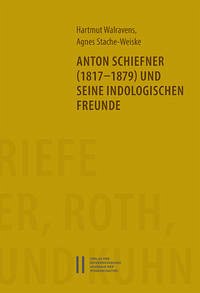Anton Schiefner was one of the most talented and best-connected linguists of the 19th century. Born at Reval (now Tallinn), as the son of a Bohemian glass merchant, he studied law and philology, taught the classical languages at Saint Petersburg and worked there also as librarian and member of the Imperial Academy of Sciences. He became the successor to Isaak Jakob Schmidt as an expert in Tibetan and achieved reputation as editor of the collected works of the Finnish ethnologist Matthias Alexander Castrén, as translator of the Finnish national epic Kalevala and the heroic songs of the Minussinsk Tatars into metric German, and as editor of the Turkic oral folk traditions collected by Friedrich Wilhelm Radloff in Central Asia. In addition he studied Finnic languages in Russia and revised and edited Baron Peter von Uslar’s pioneer collections of Caucasian language material. He was good friends with many linguists and folklorists of his time, such as Otto von Böhtlingk, Rudolf Roth, Albrecht Weber, Adalbert Kuhn and Bernhard Jülg. Many of his often long and detailed letters to his colleagues are still extant and are an interesting source for the history of linguistic and Oriental study of the period. Schiefner, as a seasoned traveler, was not only in contact with scholars in Central Europe but in France and Great Britain as well. The present edition of letters is copiously annotated, enriched with portraits of the correspondents while an index facilitates access. Anton Schiefner gehört zu den vielseitigsten und am besten vernetzten Linguisten des 19. Jahrhunderts. Als Sohn eines böhmischen Glashändlers in Reval (dem heutigen Tallinn) geboren, studierte er Jura und Philologie, lehrte die klassischen Sprachen in St. Petersburg und wirkte dortselbst als Bibliothekar und Mitglied der Kaiserlichen Akademie der Wissenschaften. Er wurde Nachfolger von Isaak Jakob Schmidt als Fachmann für das Tibetische, wurde darüber hinaus bekannt als Herausgeber der zwölfbändigen Ausgabe der Werke des finnischen Ethnologen Matthias Alexander Castrén, als Übersetzer des finnischen Nationalepos Kalevala wie auch der Lieder der minussinschen Tataren in eine metrische deutsche Form und als Herausgeber von volkstümlichen Texten, die Friedrich Wilhelm Radloff in Zentralasien gesammelt hatte. Er beschäftigte sich intensiv mit den finnischen Sprachen und bearbeitete in mehreren Monographien die grundlegenden kaukasischen Sprachsammlungen des Barons Peter von Uslar. Er war mit zahlreichen Linguisten und Folkloristen seiner Zeit befreundet, so mit Otto von Böhtlingk, Rudolf Roth, Albrecht Weber, Adalbert Kuhn und Bernhard Jülg. Seine ausführlichen, vielfach detaillierten Briefe an seine Kollegen haben sich großenteils erhalten und liefern ein höchst aufschlussreiches Bild der damaligen Linguistik und Orientalistik. Dank zahlreicher Reisen war Schiefner nicht nur mit vielen Gelehrten in Mitteleuropa, sondern auch in Frankreich und Großbritannien in Beziehung. Die vorliegende Briefedition ist ausführlich annotiert, mit Porträts der Korrespondenten versehen und durch ein Register erschlossen.
Bitte wählen Sie Ihr Anliegen aus.
Rechnungen
Retourenschein anfordern
Bestellstatus
Storno

